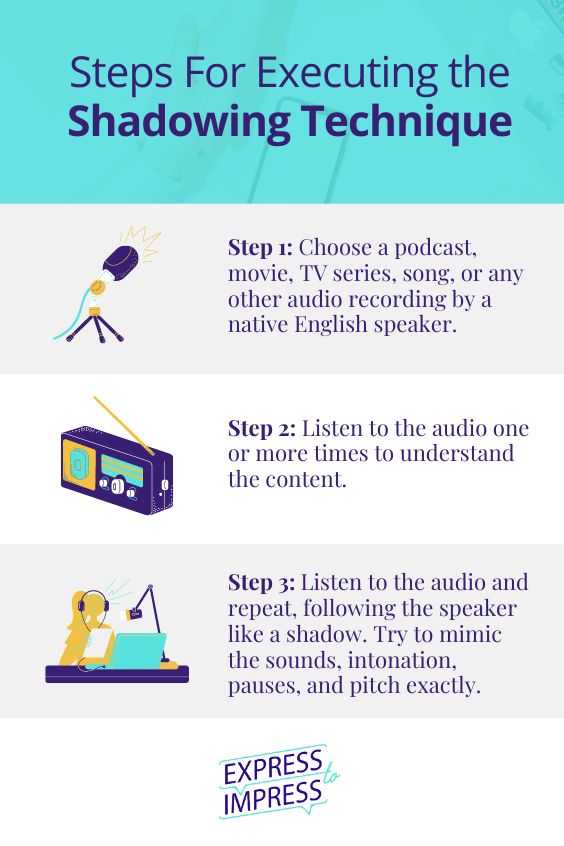You don't need expensive classes or to live in an English-speaking country to become fluent in English. With consistent practice and the right techniques, you can significantly improve your spoken English from the comfort of your home. Here are seven effective methods that have helped thousands of learners worldwide.
1. Shadowing Technique

How it works:
Shadowing involves listening to native English speech and repeating what you hear simultaneously or with a slight delay. This technique helps with pronunciation, intonation, and fluency.
How to practice:
- Choose audio with transcripts (podcasts, TED Talks, audiobooks)
- Listen to a short segment (10-20 seconds)
- Repeat immediately while trying to match the speaker's rhythm and tone
- Gradually increase the length of segments as you improve
Recommended Resources:
BBC Learning English, ESL Pod, TED Talks with transcripts
2. Self-Talk Practice

How it works:
Speaking to yourself in English might feel strange at first, but it's an incredibly effective way to practice forming sentences quickly and thinking in English.
How to practice:
- Describe your daily activities in English as you do them
- Have imaginary conversations with yourself
- Record yourself and analyze your speech patterns
- Challenge yourself to think in English throughout the day
Pro Tip:
Start with simple present tense descriptions, then gradually incorporate more complex grammar.
3. Language Exchange Partners

How it works:
Partner with native English speakers who want to learn your native language for mutually beneficial practice sessions.
How to practice:
- Use platforms like Tandem, HelloTalk, or ConversationExchange
- Schedule regular video calls (start with 30 minutes each language)
- Prepare topics in advance to avoid awkward silences
- Ask for corrections and feedback on your speaking
Recommended Platforms:
Tandem, HelloTalk, ConversationExchange, Speaky
4. Record and Analyze Your Speech

How it works:
Recording yourself speaking English allows you to objectively evaluate your pronunciation, fluency, and grammar mistakes.
How to practice:
- Choose a topic or read a short passage
- Record yourself speaking for 1-2 minutes
- Listen back and identify areas for improvement
- Compare your recording to native speaker audio
- Keep a speaking journal to track progress
Pro Tip:
Focus on one aspect at a time (pronunciation, fluency, grammar) to avoid overwhelm.
5. Use Language Learning Apps with Speaking Features

How it works:
Modern language apps incorporate speech recognition technology to provide instant feedback on your pronunciation.
How to practice:
- Use apps with speaking exercises daily
- Repeat after the app's audio samples
- Pay attention to pronunciation feedback
- Practice challenging sounds repeatedly
Recommended Apps:
Elsa Speak, Speechling, Duolingo, Babbel, Rosetta Stone
6. Watch and Repeat TV Shows/Movies

How it works:
Using authentic English media helps you learn natural expressions, pronunciation, and cultural context.
How to practice:
- Choose scenes with everyday conversations (not action-heavy)
- Watch with English subtitles first
- Pause and repeat lines after characters
- Mimic their intonation and expressions
- Keep a notebook of useful phrases
Pro Tip:
Start with sitcoms (Friends, The Office) as they use more conversational English than movies.
7. Join Online English Speaking Communities

How it works:
Participating in English discussion groups provides regular speaking practice and motivation from fellow learners.
How to practice:
- Find Facebook groups or Discord servers for English learners
- Participate in weekly speaking events
- Join English conversation clubs on Meetup.com
- Engage in voice chats about topics that interest you
Recommended Communities:
r/EnglishLearning on Reddit, English Club forums, Discord English learning servers
Consistency is Key
Improving your English speaking skills requires regular practice. Choose 2-3 methods from this list that work best for you and commit to practicing them daily, even if only for 15-20 minutes. Track your progress by recording yourself monthly, and don't be afraid to make mistakes - they're an essential part of the learning process.
Ready to improve your English speaking?
Start today by choosing one method to implement. Share your goals in the comments below!
Get Personalized AdviceFrequently Asked Questions
According to the Foreign Service Institute (FSI), it takes approximately 600-750 hours of study to reach professional working proficiency in English for native speakers of similar languages. However, fluency depends on many factors including your native language, daily practice time, and learning methods. With consistent daily practice (1-2 hours), most learners see significant improvement in 3-6 months.
The shadowing technique combined with recording and analyzing your speech tends to be most effective for pronunciation improvement. Apps like Elsa Speak that provide instant pronunciation feedback are also excellent tools. Remember that improving pronunciation requires focused attention on mouth movements and sounds - try practicing in front of a mirror.
Start with low-pressure situations like speaking to yourself or recording private videos. Join learner communities where everyone is at a similar level. Remember that most native speakers appreciate your effort to speak their language and won't judge mistakes. Gradually expose yourself to more challenging situations as your confidence grows.